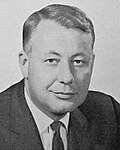| |||||||||||||||||
| |||||||||||||||||
Hathaway: 50–60% 60–70% 70–80% 80–90% >90% Smith: 50–60% 60–70% 70–80% 80–90% >90% Tie: 50% | |||||||||||||||||
| |||||||||||||||||
| Elections in Maine |
|---|
 |
The 1972 United States Senate election in Maine was held on November 7, 1972. Incumbent Republican U.S. Senator Margaret Chase Smith ran for re-election to a fifth term, but was defeated by Democrat William Hathaway. As of 2025 [update] , this was the last time the Democrats won the Class 2 Senate seat from Maine.
Contents
- Background
- Republican primary
- Candidates
- Results
- Democratic primary
- Candidates 2
- Results 2
- General election
- Debate
- Results 3
- See also
- References
To date, this remains one of only two times in history (along with the 1846 election) that a Democrat has been elected to this seat for a full term, and the only such instance since the founding of the Republican Party. Maine was one of fifteen states alongside Alabama, Arkansas, Colorado, Delaware, Georgia, Iowa, Louisiana, Minnesota, Mississippi, Montana, New Hampshire, Rhode Island, South Dakota and West Virginia that were won by Republican President Richard Nixon in 1972 that elected Democrats to the United States Senate.



